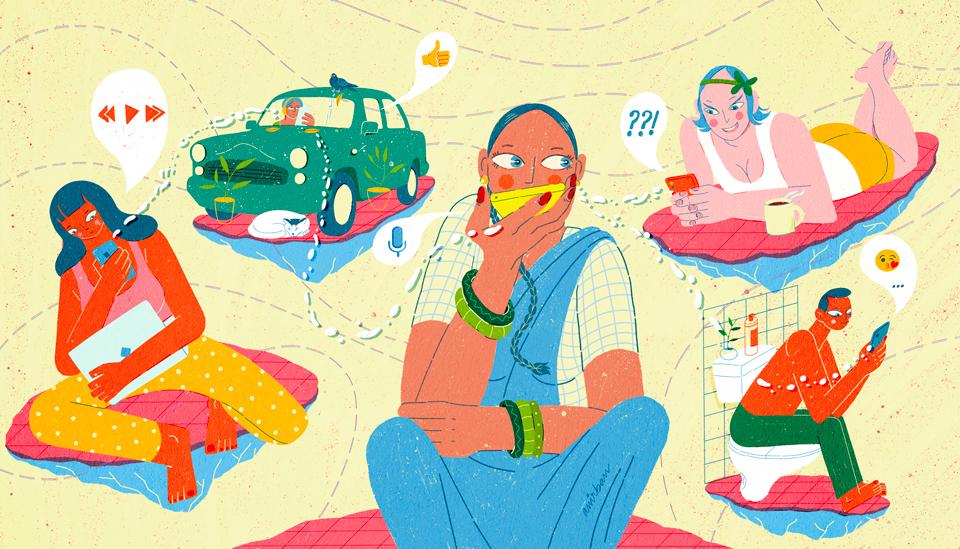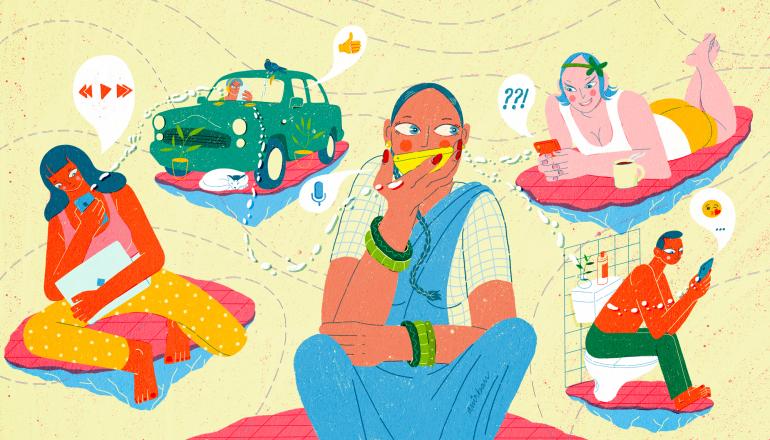
Image description: Drawings of people using their devices, their faces depicting varying emotions. Illustration by Anirban Ghosh.
While the common global refrain has been that we live in unprecedented times, it shouldn’t be remembered to mean the worst alone. It has also engendered the exposure of the egregious systemic violence faced by many, many communities across the world. Speaking from the context of India, it has made clear the numerous ways that deep discrimination continued despite the veneer of democratic rule. Its citizens have always been divided across the lines of caste, creed, class, corporeal constitutions and carnal desires. And now, the pandemic has laid bare all of these truths. Being further pushed into our bubbles to adhere to prevention (protection?) protocols, there has been an overwhelming need to reach out to one another through any means available to us. And this universal search has managed to wipe down, slightly, the stigma around seeking mental health support. There has been a marked increase in people turning towards technology as a means to more easily access therapy services.
We’ve Got 99 Problems But This Ain’t One
“The pandemic has given everyone permission to not be okay. Everyone needs help, so no one stands out,” offers Kusum Dhar Prabhu, a Jungian psychoanalyst. And she is also quick to add that, “this shift has been easier for some people more than others”. Through her own practice, she has found that while technology platforms have eased access to sessions, it has its own troubles. “For those used to in-person sessions, it has become harder to carve out time and space from their children running around, or the possibility of being overheard because everyone is at home now definitely affects the flow but also disturbs the safety aspect. There are also the difficulties of accessing or using technology in the first place,” she points out. “People are finding ways to work around this too, they’ve been sitting in their cars, or marking out space away from their families since everyone is at home all the time now to still make these meetings happen,” she adds. It seems that technology has dropped one of the hurdles to accessing mental health support.
For those used to in-person sessions, it has become harder to carve out time and space from their children running around, or the possibility of being overheard because everyone is at home now definitely affects the flow but also disturbs the safety aspect.
Rashi Vidyasagar, director of communications and strategy at The Alternative Story, an organisation that has been providing technology-assisted therapy for the past two years gives her own example with regards to technology enabling her to reach out for help. “I have depression and anxiety, especially at a difficult time, getting out of bed, making myself look presentable, taking transport and going out for therapy can be very daunting but with therapy enabled through technology platforms, it is about creating a private space and logging in,” she says. “We’ve been hosting weekly webinars on mental health topics ranging from anxiety to affected sleep cycles, and we’ve had a very healthy response in this time. The high-school level of cool vs uncool has been applied to mental health and it seems everyone has agreed that it isn’t completely uncool anymore. The pandemic has allowed us to feel these aren’t ‘personal failings’ and realise the impact of the outside world on our physical and mental well-being,” she states.
We Need More Room To Move
Rashi understands that space is a huge issue for most people and admitting to needing mental health support and the pervasiveness of the internet is still a primarily urban phenomenon but they have found ways to overcome certain situations through the means of technology again. “While practising therapists might be able to negotiate with their family for the professional and private space needed to provide support, it isn’t always possible for the clients to do the same,” Rashi shares with us. “Especially for our women clients, who might not have shared that they’ve been going to therapy because they were accessing traditional modes through an extra hour at their lunch-breaks before. They’re dealing with their sexuality, trauma or increased domestic violence with their intimate partners and sharing these things with their parents, partners or other authority figures means the further loss of their autonomy,” she explains. “In these instances, we’ve found that text-based chat sessions have greatly helped them. And it seems to allow them to carve out a space of their own without being explicit about it. The low effort needed means they’re more likely to continue with seeking out the support they need,” she adds.
Sunitha MR, a practitioner of Family Constellations Therapy echoes these sentiments when she says, “before we’d believed that we were masters of our fates and we can deal with everything on our own”. In the ways that people have been seeking her out, Sunitha has noticed other things as well. “This idea of independent living has been removed, and now that the scaffolding of modernity has been stripped away too, we’re looking towards traditional systems of support for solutions. And we’ve had to use the medium – technology – not as a means to escape, which is still partially true but also to be real. We’ve come to see that we really need people and we thrive within a community,” she says. “It seems to be that technology is an extension of who we are rather than an erasure of who we are – in these times,” she thoughtfully adds.
It seems to be that technology is an extension of who we are rather than an erasure of who we are – in these times
While in Sunitha’s practice, she would like to ideally meet people physically, she has found ways of moulding, designing and adapting her techniques to align with providing these services virtually as well. “Now I’ve come to see that it can be wonderful for people to feel heard. It is a very powerful feeling and a real boon for most of them to be in a group with other individuals and still be in their private spaces,” she says. “And for a lot of them it is the only private time they can even take for themselves and this space of therapy has been a great way to still be with one another despite distances,” she adds.
We Should All Roam Free In The World
While our collective attitude might have changed towards those seeking mental health support because of the extraordinary circumstances generated by the pandemic, it hasn’t been the same for everyone. Aryan Somaiya, a trans man and practising therapist with The Alternative Story insists on pointing out the privileges of the individuals who are able to access this means of support. “Heterosexuals and most cisgender queer people haven’t ever experienced this acute sense of isolation before. And in that, the pandemic has been a great equaliser,” he declares. “But even now who has easier access, or even knows about these support services is still a matter of privilege. It is like even before if one is cisgender it was easier to go to a hospital than as a trans person, this difference persists with mental health support too,” he explains. Though it isn’t all gloom and doom, he swiftly points out. “Even five years ago, it might have been extremely difficult to find a queer and trans affirmative therapist but now there is a slowly growing pool of resources and infrastructure that offers mental health support to queer and trans people.”
Heterosexuals and most cisgender queer people haven’t ever experienced this acute sense of isolation before. And in that, the pandemic has been a great equaliser.
In his practice as a professional therapist, or even as an active member of the trans community, Aryan has found himself using technology quite a bit in this time. It hasn’t been simply a tool for providing therapy but also to empower his clients to express themselves. “The present economic situation has forced the few trans persons who could afford to live on their own to move back to their family home. And staying with them has been a daily dose of microaggressions like conversations about getting married or violence like forcing them to dress in the clothes of the gender assigned to them at birth. It is a constant sense of erasure and invisibilization that they have to face within these spaces,” he tells us. “At these times, I’ve found technology has been the valve to allow them to express themselves, which has really helped. Like creating a private Instagram account where you can be the gender you want to be but these are just short-term outlets,” he adds. “Though I also advise them to have a security code for their phones and hidden folders of these photographs for their own safety,” he stresses.
I’ve found technology has been the valve to allow them to express themselves, which has really helped. Like creating a private Instagram account where you can be the gender you want to be but these are just short-term outlets
Aryan also tells us of one of the ways the literacy and awareness required to access certain technology forums has also been bypassed by the trans men community in this time. “I’m presently part of six WhatsApp groups populated with trans men from across the country, who express their anxieties but also talk about everyday things like what they cooked, or the shows they’re watching and so on. And they do this through voice notes,” he explains. “It has become a way to just check in with another and feel less lonely in these times.”
While technology hasn’t undone all of the impediments placed before certain marginalised communities, it has definitely lowered the bar to accessing mental health support for all. But it will take learning lessons from this pandemic that we can’t wait for these services to trickle down but we must rather insist that they start from the ground up.

Image description: Drawings of people using their devices with different expressions on their face. Illustration by Anirban Ghosh.
- 8339 views






Add new comment